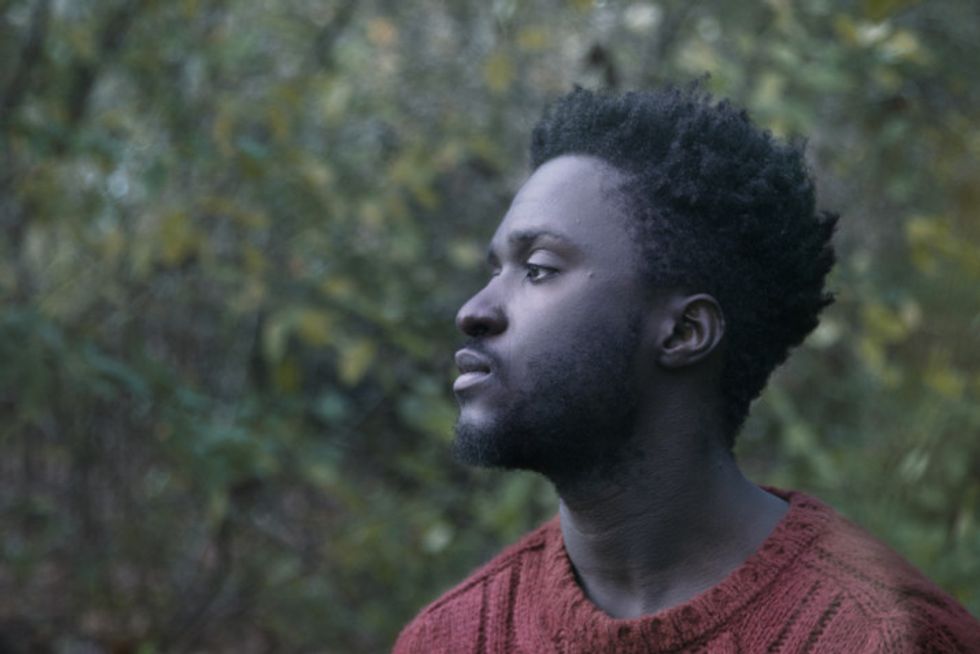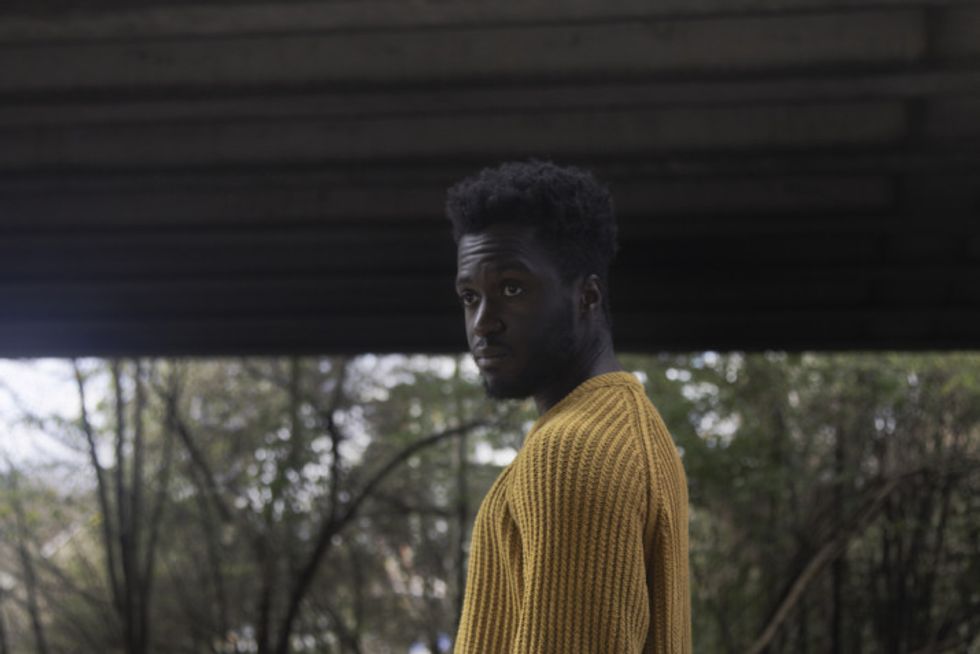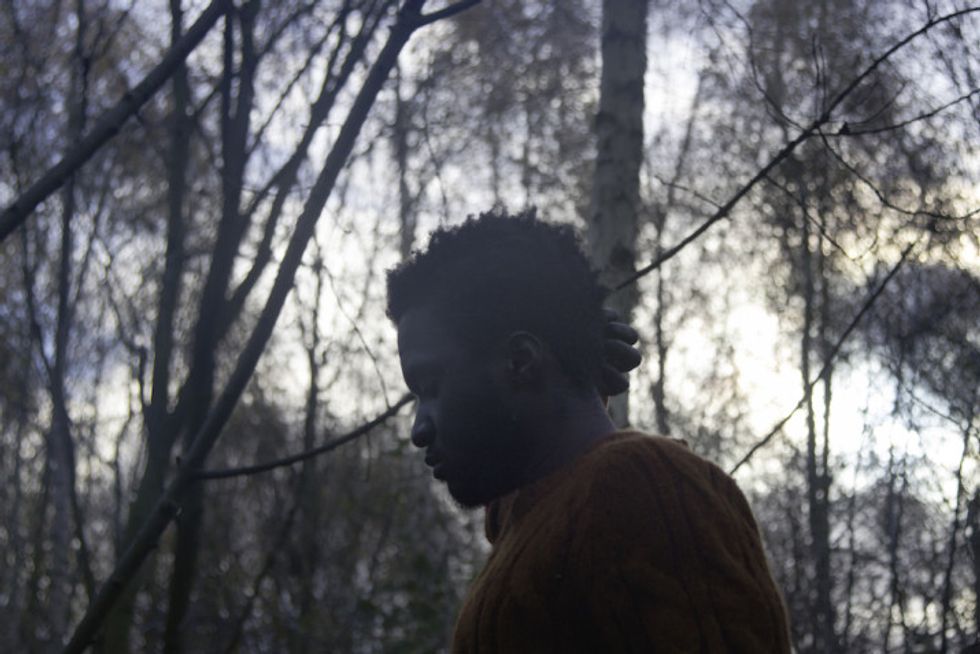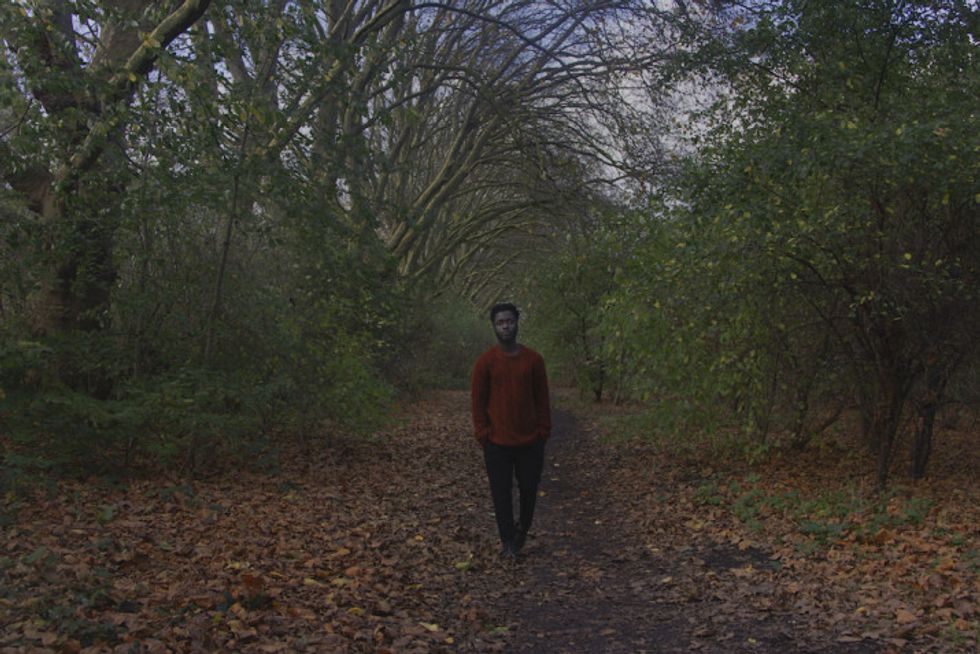Kwabs, The Sound Of A Man Announcing Himself To The World
Kwabs opens up about his Ghanaian heritage, the exploration of dualities in 'Love + War' and the importance of being yourself.
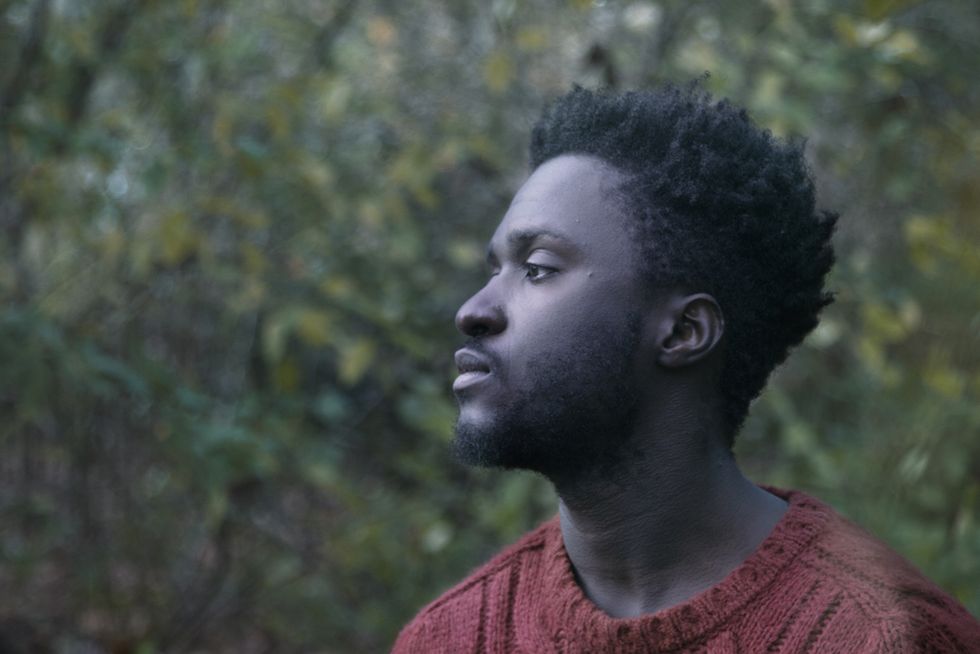
Kwabs. Photography by Amelia Shivani Hassard.
Warming up his vocal chords is a habit that Kwabs can't quite kick. The singer floats in and out of song as we sit canal-side in Hackney waiting for our hot drinks. Short bursts of humming hint at the power in his voice but it's only later when he breaks into the hook from Joan Armatrading's "Love and Affection" that the weight and authority of Kwabs' baritone reveals his position as one of London’s top new talents.
Kwabs is short for Kwabena—the name given to a Ghanaian boy born on a Tuesday. It describes a child that is neutral in all matters and never takes sides. In his latest work Love + War, Kwabs explores this identity by evaluating both sides of binary constructs through lyrics and sounds.
"I strongly believe in the nature of it being ok to not be ok” — Kwabs
"There are certain songs that tap into the core message of who you are as an artist, and ‘Spirit Fade’ is one of those," says Kwabs sipping on chamomile tea a week before the second leg of his European Love and War tour. One of his favourite tracks, "Spirit Fade" is an ode to Kwabs’ past, sung over skittering beats and melancholy synths. The South London singer, whose 2012 cover of James Blake's “The Wilhelm Scream” caused ripples on Youtube and beyond, is humble and charming—his insights about life broken up by heartfelt laughter. With three EPs and a debut album under his belt, Kwabs seems unfazed by his growing international success.
"I strongly believe in the nature of it being ok to not be ok” he says about his core message. Tracks like “Spirit Fade” conjure up worlds of past pain and suffering, but there’s always an element of hope tied to the melancholy. While Kwabs' Pray For Love EP suggests an interior life colored by sadness, the determination in his voice also asserts a commitment to learning from pain and moving through it. "In my life, I've never let anyone tell me to get over anything too quickly, and that's why I'm a happy individual, because I confront things".
Photography by Amelia Shivani Hassard.
Heartbreak is also a major theme on Kwabs’ debut album Love + War, yet the 25-year-old also ventures beyond the well trodden landscape of romantic intimacy to explore the complexities of parent-child relationships. Tracks like “Father Figure” and “Fight For Love” deal with the nature of "not being able to take parental love for granted" especially as a child who has been through the care system.
Kwabena Adjepong was born and raised in London, where he lived in care from the age of 11. Though his mother is Ghanaian, he initially reconnected with his Ghanaian heritage through his foster family. Visiting Ghana first when he was 22, Kwabs was able to meet his biological family and re-establish the links that were cut when his mother moved to the UK five years before he was born.
"I'd tour in Ghana definitely, but there's a journey I have to take in that country outside of and away from my career" — Kwabs
He describes his first trip to Ghana as difficult but necessary and plans on returning. The calabash and Ghanaian statue in his house are symbols of a deeply personal journey and a heritage that he is still exploring. While he’s not directly influenced by the contemporary hiplife sounds of Ghana—he does know of Sarkodie though—Kwabs was intent of having syncopated drums on tracks like “Into You.” Though he's not planning a tour in Ghana yet, the singer is heading there to visit family over Christmas. "I'd tour in Ghana definitely, but there's a journey I have to take in that country outside of and away from my career," he says.
Kwabs "Fight For Love" from Love + War.
Walking along the canal and into the depths of Hackney Wick Woodland, Kwabs opens up about a real desire to explore the United States, not only to share his music with American fans who have only just got their hands on his Walk EP, but also to gain a better understanding of what life is like for people.
"I'd really like to get a sense of the racial dynamics in the States, really understand them." Race and identity politics may not be at the forefront of Kwabs' musical output but his self-assurance and commitment to his individuality are refreshingly tangible. When a fan attempted to police the singer’s identity by claiming he should represent “where he actually comes from,” Kwabs was calmly dismissive.
![]() Photography by Amelia Shivani Hassard.
Photography by Amelia Shivani Hassard.
Kwabs has always been in control of his artistic direction. Three years in the making, it's clear how much his debut album Love + War means to him. In those three years, Kwabs released the EPs Pray For Love and Wrong or Right, which both flirted with minimal beats and elements of electro. In contrast, Love + War explores a more pop aesthetic, although an experimental undertone remains. "I wanted to clash the expected sound with something else, that's what really makes me tick."
“I fell apart when I couldn’t see I was cheating on me” — Kwabs
Sonic exploration is Kwabs' bread and butter. While studying Jazz at London's Royal College of Music, he experimented with all kinds of sounds, including being part of London Vocal Project Choir singing contemporary folk music. Kwabs nods to greats such as Sarah Vaughn and Gregory Porter as influences but he's also in tune with current innovators on the scene like rising star NAO and Australian soul man Jordan Rakei.
Photography by Amelia Shivani Hassard.
But Kwabs is careful not to let his influences overpower his sense of self. "You'd be surprised by how much stuff didn't make the cut, because it just wasn't me," he mentions. Hearing him talk, it’s obvious that Kwabs is acutely aware of the commercial aspect of his job but his love for music always comes first. A big fan of the hook on Joan Armatrading's classic "Love and Affection," Kwabs sampled it on “Father Figure”—the only sample on the entire album—and sent the track to the veteran singer to make sure she approved of how he'd used it.
Teaming up with Austrian producer Sohn on Wrong or Right EP and Dave Okumu (The Invisible) gave Kwabs a chance to play with different approaches to songwriting. "I'd not had that sort of avuncular figure in my creative life at all, it was great", says the 25-year-old of his time spent working with Okumu. That collaboration led to a stripped-down experimental version of “Lay Back.” Amidst the shifts in musical direction, the soulful texture of Kwabs' voice has been a constant. Emotive and powerful; it is the sound of a man announcing himself to the world.
Kwabs "Perfect Ruin" from Love + War.
Love + War, Wrong or Right: Kwabs' music seems to trace his exploration of dualities, a search for guiding principles through which to live life.
Kwabs is interested in the concepts of moral values and truth. He's currently reading The Poisonwood Bible, a book which explores the morality and hypocrisy of missionaries in the Congo. It doesn't take a long time to realise that Kwabs' journey so far has led to a commitment to liking himself and the music that he makes. The value he places on self love is crystal clear on “Cheating on Me,” a song he wrote about looking after yourself in order to love others fully. "I fell apart when I couldn't see I was cheating on me," he sings.
Love + War is available now, check out a new remix of "Cheating On Me" from Tom Misch and Zak Abel.
Remi Graves is a London-based writer and music geek in search of the perfect sound. Check out her monthly radio show The Two Step and follow her on Twitter for updates.
